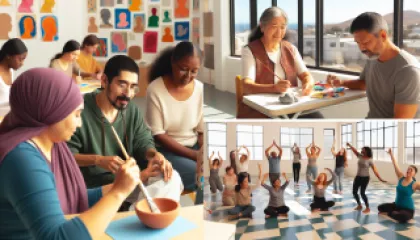Mastering Creative Therapy: A Comprehensive Guide
The world of therapy is as vast and varied as the individuals it seeks to help. Among its many branches, one stands out for its innovative approach and transformative potential: Creative Therapy. This therapeutic discipline employs art, music, dance, drama, writing, and other forms of creative expression as conduits for healing and personal growth.
What is Creative Therapy?
Creative therapy, also known as expressive arts therapy, is an integrative approach to psychotherapy that uses the process of making and creating art to improve a person's physical, mental, and emotional well-being. It offers a unique channel for individuals to explore their feelings, reconcile emotional conflicts, foster self-awareness, manage behavior and addictions, develop social skills, improve reality orientation, reduce anxiety, and increase self-esteem.
Types of Creative Therapy
There are several types of creative therapy, each employing a different form of artistic expression. Let's delve into these various types:
Art Therapy
Art therapy uses visual art-making, such as painting, drawing, or sculpture, as a means of communication and expression. It encourages individuals to express and understand emotions through artistic expression and creative process. Art therapists often work with individuals who have experienced trauma, depression, chronic illness, and more.
Music Therapy
Music therapy harnesses the power of music to effect change in individuals' cognition, emotions, and behaviors. It can involve listening to music, creating music, playing instruments, and singing. Music therapists work with a variety of individuals, including those with mental health disorders, developmental and learning disabilities, Alzheimer's disease, and acute and chronic pain.
Dance/Movement Therapy
Dance/movement therapy, or DMT, uses movement to support the intellectual, emotional, and motor functions of the body. As a form of expressive therapy, DMT looks at the correlation between movement and emotion.
Drama Therapy
Drama therapy uses theater techniques to facilitate personal growth and promote mental health. Through acting out scenarios, individuals can explore personal issues, express complex emotions, and work on social skills.
Writing Therapy
Writing therapy, also known as journal therapy, uses the written word for therapeutic purposes. It encourages individuals to write about their feelings, thoughts, experiences to promote healing, growth, and change.
Benefits of Creative Therapy
Creative therapies offer numerous benefits, which vary depending on the type of therapy and the individual's personal circumstances:
- Promotion of Self-Expression: Creative therapies provide an outlet for expressing feelings and experiences that may be difficult to convey through traditional verbal communication.
- Enhanced Self-Awareness: The process of creating art can help individuals gain insight into their emotions, thoughts, and experiences, fostering a deeper understanding of themselves.
- Stress Reduction: The act of creating art can be calming and relaxing, helping to alleviate stress and anxiety.
- Improved Cognitive Function: Engaging in creative activities stimulates the brain, improving memory, concentration, and other cognitive functions.
- Increased Emotional Resilience: Through creative therapies, individuals can learn new ways to cope with stress, trauma, and adversity, enhancing their emotional resilience.
Implementing Creative Therapy
Therapists trained in creative therapies use a variety of techniques to help individuals express themselves and explore their feelings, thoughts, and experiences. These techniques can include guided visualization, free association, dream analysis, and various forms of art-making.
However, creative therapy isn't restricted to a therapist's office. Many activities associated with these therapies can be practiced at home, offering an accessible form of self-care and personal growth.
Art Therapy Activities
Here are some art therapy activities you can try at home:
- Create a Mood Board: Gather images, words, and objects that represent how you're feeling and create a collage.
- Paint Your Feelings: Use colors and shapes to express your current emotional state on canvas or paper.
- Make a Sculpture: Use clay or other sculpting materials to create a three-dimensional representation of an emotion or experience.
Music Therapy Activities
Here are some music therapy activities you can try at home:
- Create a Personal Playlist: Compile a list of songs that resonate with your feelings. Listen to it when you need a boost or some calm.
- Play an Instrument: If you play an instrument, use it to express your feelings. If you don't, simple percussion instruments like drums or tambourines can be effective.
- Sing: Singing can be a powerful emotional release, whether you're alone in your car or shower, or sharing a song with others.
Dance/Movement Therapy Activities
Here are some dance/movement therapy activities you can try at home:
- Free Movement: Put on some music and allow your body to move however it wants. Don't think, just move.
- Mirror Dancing: Dance with a partner and take turns leading and following each other's movements.
- Yoga: Practice yoga to connect with your body and breath, and promote mindfulness and relaxation.
Conclusion
Creative therapy is a powerful tool for self-expression, self-discovery, and healing. Whether you're working with a therapist or exploring these practices on your own, the act of creating art offers a unique pathway towards personal growth and improved mental health. Remember, the goal isn't to create perfect art, but to express yourself honestly and fully, and in doing so, to find new insights and ways of being in the world.








